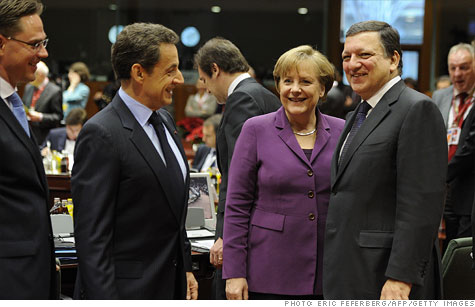Search News

Finland Prime Minister Jyrki Katainen, France President Nicolas Sarkozy, Germany Chancellor Angela Merkel and European Commission President Jose Manuel Barroso ahead of the summit.
NEW YORK (CNN) -- A majority of European leaders agreed early Friday on a new deal to try to resolve the continent's debt crisis, but some countries including Britain refused to back a broader treaty change.
The 17 members of the eurozone, which share the embattled single currency, reached a deal for a new intergovernmental treaty to deepen the integration of national budgets.
Six other EU nations supported the deal. "We're doing everything we can to save the euro," President Nicolas Sarkozy of France said at a news conference in Brussels following a marathon summit meeting of EU leaders.
German Chancellor Angela Merkel called it a 'new beginning,' saying "We have achieved a breakthrough to a stability union. A fiscal union, or stability union as I call it, will be developed further, step by step in the years to come."
But the new plan, which leaders are aiming to have ready by March, did not get the backing of Britain.
"We would rather have reformed the treaty with 27 members," Sarkozy said. But Prime Minister David Cameron of Britain demanded an "unacceptable" opt out clause related to the financial services sector, Sarkozy said.
"I said before coming to Brussels that if I couldn't get adequate safeguards for Britain in a new European treaty, then I wouldn't agree to it," said Cameron.
The British waiver would have "undermined a lot of what we've done to regulate the financial sector," Sarkozy said.
Instead, the eurozone countries, along with "anyone who wants to join us," are pushing ahead with the new treaty, he said.
"What is on offer isn't in Britain's interests, so I didn't agree to it," Cameron said.
The new deal may raise concerns of the EU turning into a two-tier system, with some countries pursuing deeper integration than others. But leaders had to act.
The national debts of euro members, including Ireland and Greece, have pushed the common currency to the brink of collapse, forcing international lenders to swoop in with bailouts.
The budget cuts they have demanded have led to mass protests that brought down governments in both countries -- and they are not the only ones with worrying levels of debt.
Larger economies like Spain and Italy have both come under pressure in financial markets recently, with their borrowing costs spiking to painfully high levels.
The French minister for European affairs, Jean Leonetti, had warned Thursday ahead of the summit meeting that the euro could "explode" and Europe could "unravel."
That would be a "disaster not only for Europe but for the whole world," Leonetti told the French TV station Canal+.
The new measures included handing over the running of the union's bailout funds to the European Central Bank and its new president, Mario Draghi, who voiced his approval of the plan but but made no mention of any additional bond-buying plans.
The ECB has been buying government bonds on a limited basis as part of an emergency program to keep yields in check and there has been growing pressure for the central bank to become more aggressive.
Draghi has repeatedly said that the ECB's only mandate is to manage inflation. The central bank announced measures Thursday to try to revive the ailing European economy and ease credit conditions for troubled eurozone banks.
European markets had a mixed reaction to the news. Stocks in London (UKX) rose 0.8%, while markets in Germany (DAX) were up 1.9% and in France (CAC40), stocks jumped 2.5%.
At the same time, borrowing costs resumed their climb, with the yield on the 10-year Italian bond headed back toward 7%, trading at 6.36% early Friday. Just two days ago, that same yield was much closer to 5%. Yields in Germany, France and Spain were also moving higher.
EU leaders have also decided to add €200 billion to the resources of the International Monetary Fund, said Christine Lagarde, the head of the IMF.
The fund has assisted in the bailout of struggling European economies, like Greece and Portugal.
"The decisions taken today by European Leaders at their summit meeting are an important contribution to helping address the crisis facing the euro zone and strengthening the global economic recovery," Lagarde said in a statement.
The new intergovernmental treaty will be easier to ratify than a change to existing treaties, said Herman Van Rompuy, the president of the European Commission.
Awareness of the urgency of taming Europe's debt woes extends beyond the continent's borders. U.S. Treasury Secretary Tim Geithner had been touring Europe ahead of the summit to underline the importance of the EU's bringing the crisis under control.
"I want to emphasize again how important it is to the United States and to countries around the world that Europe succeeds in this effort to build a stronger Europe, and I'm confident they will succeed," Geithner said in France on Wednesday.
On Thursday he met Prime Minister Mario Monti of Italy, who came to power when his country's government collapsed over its worsening debt crisis. Geithner assured Monti that Washington supported his efforts to balance his country's budget.
Monti said he would meet President Barack Obama in Washington next month.
-- CNN's Jethro Mullen and Pierre Meilhan contributed to this report. ![]()
| Overnight Avg Rate | Latest | Change | Last Week |
|---|---|---|---|
| 30 yr fixed | 3.80% | 3.88% | |
| 15 yr fixed | 3.20% | 3.23% | |
| 5/1 ARM | 3.84% | 3.88% | |
| 30 yr refi | 3.82% | 3.93% | |
| 15 yr refi | 3.20% | 3.23% |
Today's featured rates: